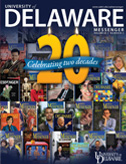
RESEARCH | Readers who appreciate Shakespeare but sometimes find themselves puzzled by the language or tangled in a plot twist might wish they had an expert sitting next to them who could instantly clarify any confusion.
Now, there's an app for that.
"I'm not a techie by any means, but I've become a true convert to the iPad," says Kristen Poole, professor of English at UD and a Shakespearean scholar who is working on a new project to put his plays in multimedia, interactive form on the mobile device.

"I approached the project thinking about the way people—including myself—read nowadays, 20 minutes here and there while waiting to pick up their children from a music lesson or sitting in the dentist's office. Not many people have four hours to sit down and do nothing but read Shakespeare."
Poole worked on The Tempest, the first Shakespeare play to be completed as a launch of the new iPad application, writing a series of brief, explanatory essays that readers can access by a touch of the screen as they make their way through the drama. One of the next plays in the project will be Romeo and Juliet, for which Poole will be the content director.
The new app, sold through iTunes or Apple, was developed by Profs. Katherine Rowe of Bryn Mawr College and Elliott Visconsi of Notre Dame University, with seed money provided by Notre Dame. Visconsi asked noted Shakespeare scholars, including Poole, to contribute the essays that explain various parts of The Tempest in what is called a "lecture stream."
Using these streams, a reader who is using the iPad to delve into an e-book version of The Tempest and comes across a passage he either doesn't fully understand or just would like to consider in more depth can choose a topic and access a short essay relating to that passage. The text of the essay—which might discuss the plot, character development, historical background or any number of other aspects—appears on the screen next to the play itself.
"There are so many ways to approach Shakespeare, and I've learned from my years of teaching that different students are interested in different things," says Poole, who drew on her classroom experience as she wrote her essays.
"Some are interested in the historical context of the time, some in the way the play was produced at the Globe Theatre, some in Shakespeare's language. This project lets them explore whatever they want and ignore what they're less interested in."
Readers can click on words or lines of the play and immediately be shown footnote-type definitions and clarifications. They also can use an audio function that lets them hear the play performed—with each line highlighted in the text as it is spoken—by Actors from the London Stage, an internationally known touring Shakespeare theatre company. In selected passages that might have a variety of interpretations, the user can choose to hear different readings that demonstrate alternate ways of understanding the scene or character.
Those involved in the app say the many features are designed to appeal to all levels of readers, from serious students to casual fans.
"This app is not just for the classroom," Visconsi says. "It's designed for anyone who loves Shakespeare, or anyone who wants to love Shakespeare but needs some help to do so."
And just because the new platform may make the plays more accessible to a wider range of readers, Poole says, that doesn't make it a less serious way of experiencing the Bard.
"I think that sometimes people imagine that these kinds of projects are a substitute for real scholarship," she says. "But everyone involved in this is a scholar at the top of his or her field. It's a way of actively translating scholarship to the public, and that makes it very valuable."





